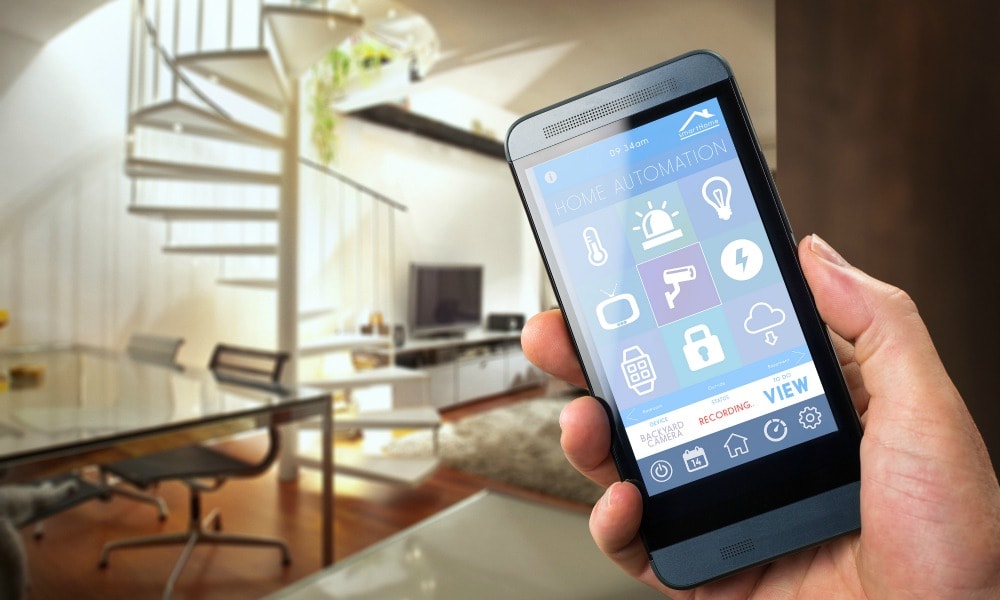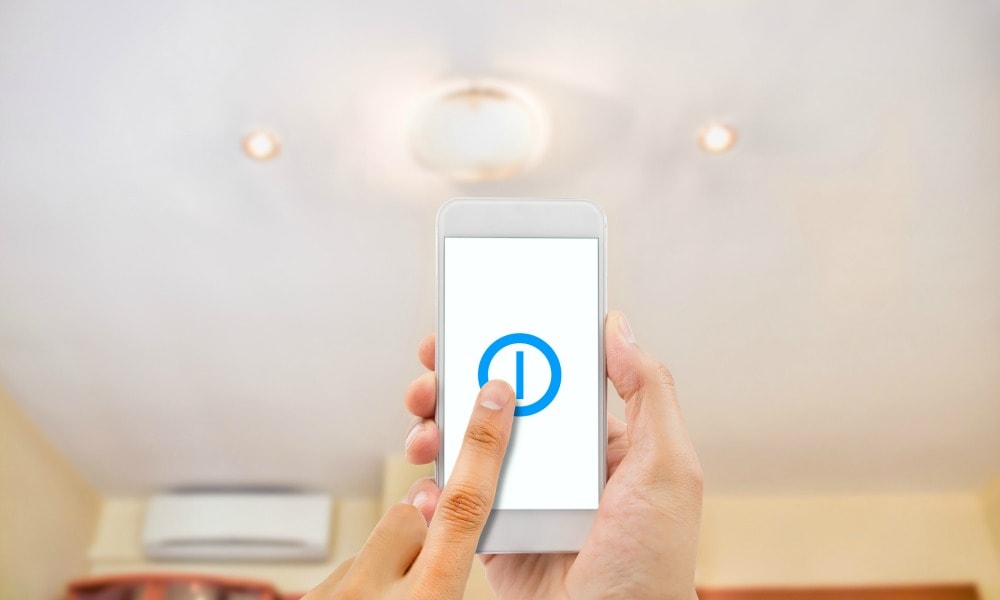Nowadays, modern renters expect amenities that offer convenience, efficiency, added security, and enhanced comfort. As the industry becomes increasingly competitive, “smart” technology is at the top of many tenants’ list of desires. Therefore, by strategically installing smart devices in a rental, landlords can turn that property into a smart home. Thus, increasing its value and desirability in the eyes of potential renters. That said, adding advanced technology may be a considerable investment. So, how do owners know what technology is best in a rental property? Continue reading below for our tips on smart home upgrades to enhance your rental investment.

What is a “Smart” Home?
The term smart home refers to a property where devices or appliances can be controlled through one central point. For example, things like door locks, security systems, thermostats, lights, or even appliances can be accessed via a smartphone, laptop, tablet, or gaming console. These interconnected devices use the internet or mobile device data to allow users to control functions virtually anywhere. Thus, creating a convenient home automation system and a significant selling point for tenants.
Top Smart Home Upgrades for Your Rental Property
Home technology systems can range from the simple to the extravagant, but there is no need to go overboard in a rental property. In fact, there are several moderately priced options to help keep costs low while justifying a higher rent rate and attracting quality tenants. So, check out our suggestions for smart home upgrades that offer the best ROI.
- Install Smart Thermostats
- Add Smart Locks
- Switch to Smart Bulbs
Install Smart Thermostats
Did you know that heating and cooling accounts for more than half of the energy used in the average home, which makes it one of the most significant expenses for most homes? That said, installing a smart thermostat can provide more control over heating and cooling to maximize efficiency and boost savings.
Smart thermostats allow your tenants to remotely control a property’s temperature (and monitor energy usage) with a smartphone, tablet, or even their desktop. On top of that, some smart thermostats can “learn” a tenant’s patterns and adjust accordingly. For tenants, the benefits of an intelligent thermostat are numerous including –
- Valuable Energy Savings – With smart thermostats, residents can schedule the HVAC to run less during the day when no one is home. Thus, saving valuable energy and money!
- Easily Monitor Energy Usage – Typically, digital thermostats allow residents to view and track their energy usage. This will enable residents to adjust their preferences as needed.
- Control the Temperature from Anywhere – Installing one of these smart home upgrades equals added convenience for tenants. Tenants can benefit from HVAC alerts and remote monitoring from anywhere with a Wifi connection.
For landlords, a smart home thermostat is one of the easiest smart home upgrades to install – as long as you have existing wiring. In some cases, this could be an easy DIY project for those with some electrical experience, or it is also economical to hire a professional. While different models and features vary in cost, most homeowners spend around $250 to $500 to install a smart home thermostat.
Add Smart Locks
Ask any renter, and most will tell you that security is a top concern in their rental home. However, smart locks are smart home upgrades that benefit landlords and tenants in different ways. Smart locks replace traditional locks with an electronic key system. This system uses an electronic signal from an authorized device to lock and unlock doors instead of the standard key.
Smart locks come in two types, those that work with the home’s existing lock and those that will completely replace it. That said, either option is easy to install with only basic tools. However, depending on the type and model an owner chooses, it may take additional time to calibrate or set up connectivity. On average, rental owners should plan to spend between $150 and $550 on this upgrade.
For tenants and landlords, smart locks mean no more middle-of-the-night lockouts if a resident forgets or loses their key. Additionally, these devices are convenient for landlords that remotely manage their property. Thus, allowing owners to track who enters the home and remotely provide access for property showings.
Pro Tip: Worried about what might happen if your tenant’s smartphone dies and they need to enter their home? Don’t worry – a smart lock can still be opened with a traditional key if required!
Switch to Smart Bulbs

Intelligent lights are LED bulbs with added software that allows them to connect via apps or a home automation system. Unlike traditional light bulbs, smart bulbs allow tenants to remotely control a rental’s lights at the touch of a button. In addition to remote connectivity, smart bulbs offer the following conveniences for tenants –
- Motion Sensors – Some smart bulbs offer motion sensors that detect when tenants enter the room and turn the lights on and off accordingly. Thus, avoiding accidentally leaving a light on all day!
- GPS Activation – There are smart bulbs capable of detecting the GPS in a tenant’s smartphone. Once the tenant is almost home, the lights will turn on automatically, allowing them to arrive at a well-lit home.
- Dimmable Function – This feature allows tenants to dim or brighten the lights in their homes through a convenient app. So, landlords can avoid the added cost of installing dimmer switches.
- Added Energy Savings – Lighting flexibility can translate to better efficiency and subsequent savings on the monthly electric bill.
While adding these advanced lighting features is one of the most desirable smart home upgrades, it does come at a cost. Although they provide long-term savings, the initial cost of smart bulbs can be hard to swallow. Each bulb varies based on brand and features but can cost up to $20 a piece. In addition, whether or not the bulbs require an automation hub instead of a mobile app can also impact the overall cost. That said, owners should prepare to pay an average of $400 to $800 to upgrade to smart bulbs in their rental property.
How to Evaluate the ROI of Smart Home Upgrades
When it comes to investing in any smart home upgrades, evaluating ROI or return on investment is vital. While adding smart technology can help attract quality tenants and rent the property faster, landlords need to know if the rent they can charge will offset the initial costs. So, check out these considerations when determining whether smart home upgrades are worth it.
- Is the upgrade ideal for a rental? – Not every upgrade is ideal for the added wear and tear rental properties receive. For example, while smart appliances are a selling point for buyers, the high cost of these items can backfire in a rental. These items cost more to maintain, and at the cost of around $2,000 to $6,000 for a refrigerator alone – it is not worth it.
- How does the property compare to other local listings? – For landlords, the price of a rental directly affects vacancy time. Therefore, being able to charge higher rent for smart homes, in part, depends on the local market. So, before deciding to make any smart home upgrades, carefully research the area. Do other homes in the neighborhood offer advanced smart home features? If so, how does their rent compare?
According to a study by Schlage, 55% of millennials were willing to pay a higher rental rate for properties with a smart lock. That said, the same age group said they would pay around 20% more for rentals that include smart home upgrades. But, that said, not every upgrade will achieve the same level of ROI. So, be sure to carefully consider all factors before making a final investment.
The Potential Disadvantages of Smart Technology in Your Home
It is hard to argue with the many benefits of smart home upgrades above. However, all decisions landlords make have a potential downside. Therefore, to make the most informed choice for your rental business, check out these disadvantages below.
- Security Risks – Any technology, including smart home devices, can be susceptible to security risks, bugs, or hackers. That said, there are steps landlords and tenants can take to mitigate these risks. Preventative measures include creating strong passwords or using network encryption if available.
- Initial Costs – For landlords, every expense could cut into overall profits. Therefore, the initial cost of some smart home upgrades can be a deterrent. An entire smart home system can run into the thousands of dollars and is not suited for every property.
Make the Smart Choice for Your Rental Business
Turning a rental property into a “smart home” provides tenants and landlords with convenience and control. So, if you are looking to attract higher-paying tenants, the devices mentioned above may be well worth the investment. Another smart investment for landlords is to invest in professional rental management services.
Bay Property Management Group is the area’s leading third-party rental management firm. Our team of experienced professionals maximizes an owner’s investment by providing property advertisement, rent collection, tenant screening, maintenance, inspections, accounting, and more. So, if you are looking for a property management company to help increase profits or turn your property into a smart home, contact Bay Management Group today.
